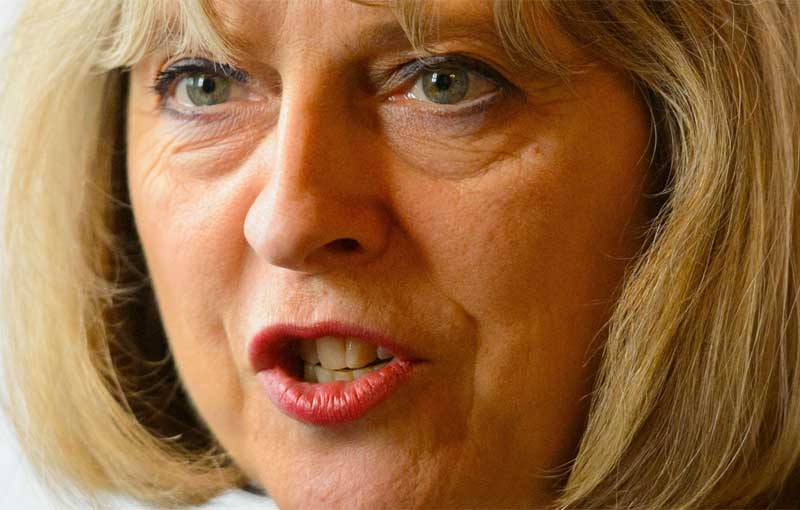 Theresa May. Image Dominic Lipinski/PA Wire
Theresa May. Image Dominic Lipinski/PA Wire
Theresa May’s address to the Conservative Party conference typified this government’s Islamophobia says Conan Doyle
Theresa May’s speech deployed Islamophobia both in the context of new military action in Iraq and Syria and also to justify (and even glorify) the stripping of civil liberties from British citizens. The transcript of the speech is not light reading; In a speech of just under 4,000 words, May uses the word Muslim(s) fifteen times, the word Islam and its derivatives 10 times, the word terrorism or terrorist 31 times, the countries Iraq 7 times and Syria 11 times, Shari’ah law twice, and that old Daily Mail favourite term ‘foreign hate preachers’ once.
This is from one of the most powerful politicians in the country: a person who, moreover gloats of her personal power to strip the civil liberties from those she does not like.
May spent a considerable amount of time describing groups she defines as terrorists abroad. Other than to show support for her party’s bellicose foreign policy, it soon becomes clear what her true motive for her demonisation of the great western political bogeyman, the foreign terrorist, as she boasted: ’I have the power to deprive them [British Nationals who travel to the of the Middle East] of their British citizenship’ yet lamented that ‘no country is allowed to make its citizens stateless, and most of those British fighters are likely to return to the UK in the end’.
No world religion other than Islam is mentioned by May, except in the context of an attack on the Jewish museum in Brussels carried out by the Frenchman Mehdi Nemmouche on 24th May this year, but who the Home Secretary does not name, rather describing him vaguely as “one of their terrorists”.
May used rhetoric about the Middle East that omitted the role of Western intervention in recent developments, presenting the following supposedly ‘timeless’ picture without any sense of what current geopolitical forces might be driving the conflicts:
‘There is the ancient split between Sunni and Shia Muslims. Tribal rivalries and hostilities. Autocracies, theocracies and, yes, democracies too. States that fight proxy wars against others in third countries. Countries that sponsor insurgent movements and terrorism. Whole regions that are beyond the control of their governments’
This rhetoric can incite tensions within British society. It also justifies an aggressive attack on our existing civil rights. May gloated about the powers granted her in the Immigration Act 2014, and Terrorism Prevention and Investigation Measures, which allow ‘people [she] cannot prosecute’ placed under indefinite house arrest. Despite gloating that these are ‘some of the strongest laws in the world’ she nevertheless states ‘we believe we need to strengthen these powers’.
Yet after briefly bemoaning the defeat of the Communications Data Bill (or “snoopers charter”) in 2010, May returns to her anti-Islamic theme, using the rhetoric of a “clash of civilisations”.
She also announced:
‘I want to see new banning orders for extremist groups that fall short of the existing laws relating to terrorism. I want to see new civil powers to target extremists who stay just within the law but still spread poisonous hatred.’
May announced a new manifesto pledge to introduce ‘Banning Orders and Extremism Disruption Orders,’ two laws designed to curb free expression in this country.
Lutfur Rahman was mentioned in the same breath as ‘Shari’ah Law’, and the Birmingham ‘Trojan Horse’ controversy was referred to.
When Theresa May states ‘we must not sleepwalk into separation, segregation and sectarianism’ she uses a language of fear and alienation which shows the true motives behind David Cameron’s pledge to repeal the Human Rights Act, the act which enshrines the European Convention on Human Rights into British law.
This type of scaremongering is not a new phenomenon in British politics, as successive generations of Conservatives have used the same arguments to deny civil rights, and stir division and sectarianism within the general population against minorities. As an Irish man living in London, I know this all too well. But rather than consigning ourselves to the repetition of bloody history, we must stand up against this language of division, and expose it for the cynical and divisive poison that it is.

